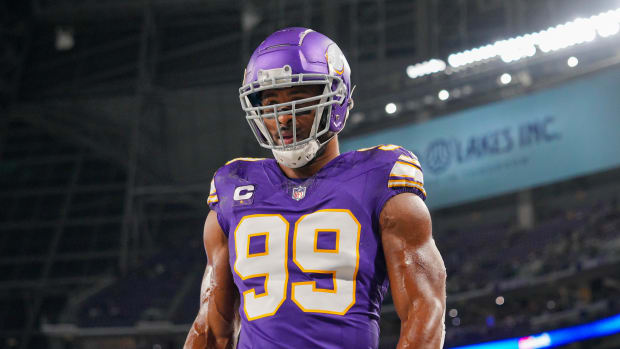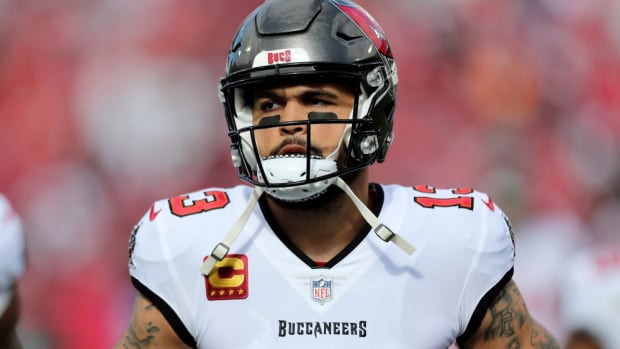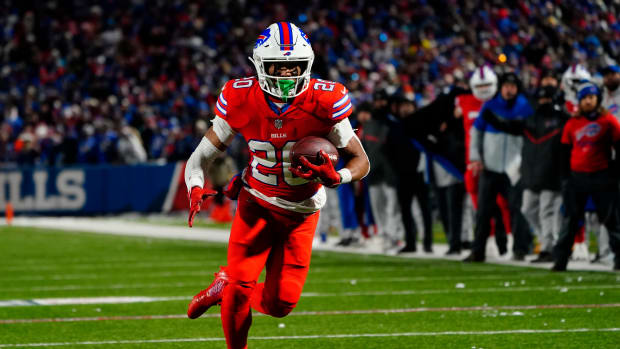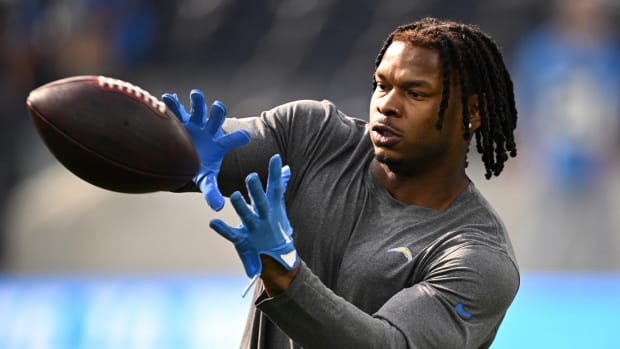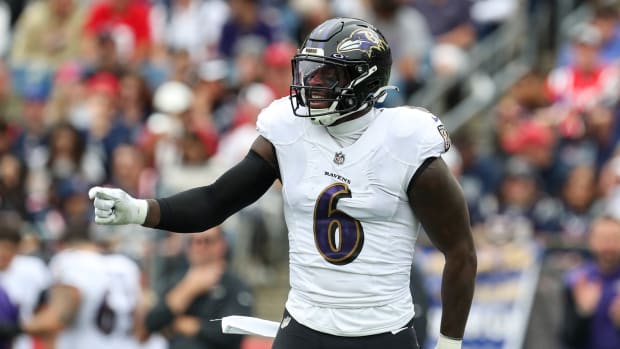Revealing The Fiction of Self-Sacrifice in Sports
As superstars Tom Brady and Kobe Bryant near the end of their careers, the teams they've played for—the Patriots and Lakers—have faced the difficult decision of whether to keep them or turn the page. (Getty Images/2)
The two-year extension signed by NBA superstar Kobe Bryant last week brought up a couple important issues in contract negotiations worth discussing as they apply to NFL teams: (1) whether or not to move on from an aging, but still signature player of the franchise; and (2) whether superstar players should take, or have taken, “hometown discounts” to allow for resources to be used on other parts of the roster. Let’s examine.
Moving on
The business of sports can be cold and merciless, yet difficult change is necessary for a franchise to move forward. As with any business, sports teams need to evolve to the next chapter of their organizational history. That can sometimes require parting with a player who has been the face of the franchise for a long period.
There are no more stark examples of this than two from the NFL in recent years: the Packers trading Brett Favre and the Colts releasing Peyton Manning. Other than perhaps Tom Brady (more on him below), there are no two NFL players in this generation more closely associated with their franchises than Favre and Manning. Although the circumstances were different, the Packers and Colts made the uncomfortable decision to move to a new chapter in their leadership, with succession plans—Aaron Rodgers and Andrew Luck—in place.
Franchise-defining decisions such as these are often prompted by contract decisions. In Manning’s case, an onerous option clause following a season lost to injury forced a Colts’ decision point prior to the free agency/trading period. In another recent separation, star running back Steven Jackson and the Rams negotiated a “contract void” following the 2012 season that allowed a graceful exit for one of the team’s hallmark players.
Bryant was in his final year of his contract (making more than $30 million) yet the Lakers, unlike the Packers and Colts, chose to hold onto the past rather than to move forward. True, there are no ready-made replacements waiting in the wings for Bryant as there were for Favre and Manning, but an opportunity to let the contract expire and pivot to a different kind of team was declined.
Five Things I Think About This Week
1. I think the volume on the “Chip Kelly’s in over his head” and “Nick Foles cannot be the long-term answer” crowds have been turned down considerably. The Eagles are a dangerous team with an underrated defense.
2. I think the Rams are the fortunate beneficiaries of the forgetful season in Washington, now in possession of what would be the second overall pick in the draft; the same pick, ironically, that begat Griffin in 2012.
3. I think that Alshon Jeffery and Josh Gordon having extraordinary performances in losses is telling. Football is the ultimate team sport; even that level of wide receiver production cannot override other deficiencies.
4. I think that the cautious treatment of Aaron Rodgers, while frustrating to fans, is expected. Having been in those meetings for years, I know that Packers’ coaches and management will defer to the doctors, even on Rodgers.
5. I think the reason the NFL leaked the potential of truly harsh penalties for Mike Tomlin—and perhaps the Steelers—is that his actions strike at the integrity of the game. The word “integrity” is being discussed a lot in the NFL offices regarding discipline.
—A.B.
These difficult divorces after long marriages can be unpopular not only with fans but even within the coaching staff and locker room. Management must understand and expect the negative emotions while separating, as gracefully as possible, from players who symbolize the team.
Taking less?
There has been much conversation as to whether Bryant should have accepted less than the roughly $24 million in each of the next two years, to allow the Lakers more flexibility in a salary cap system. It was unrealistic, however, to expect Bryant, known as the “Black Mamba” for his ruthless strikes on the court, to be submissive in business. Indeed, he probably felt that going from $30 million to $24 million was more than charitable.
And Bryant’s stance is the norm, not the exception. Taking less to help the team examples are especially overstated in the NFL, where contract restructures to defer cap charges—simple paper transactions that redistribute, not reduce, earnings—are often wrongly interpreted as player sacrifices.
One of those narratives since Bryant’s extension has been about Tom Brady. I've heard many comments in the past week along the lines of, Well, Tom Brady took less in regard to the Patriots quarterback's February contract extension. It would be a heartwarming story, except for one small detail: Tom Brady didn't take less; he took more.
Brady reality
Prior to his extension, Brady was scheduled to earn $30 million combined for the 2013 and 2014 seasons. Following the extension, Brady was scheduled to earn $33 million for the 2013 and 2014 seasons, with much better payment terms.
Brady did create short-term cap savings for the Patriots, presumably to retain Wes Welker, among others. However, Brady (1) received much better cash flow, including a $30 million signing bonus, on his two-year earnings, (2) gained another “chip” to use at the bargaining table with the Patriots when necessary, and (3) stacked further amounts to his future cap charges, complicating any possible divorce with the team.
Brady is one of dozens of players every year to restructure their contract for immediate cap savings (Ben Roethlisberger has done so with the Steelers in each of the past three seasons). Rarely do players receive any tangible benefits for doing so; Brady received an additional $3 million and better payment terms.
Hope floats
There still remains the possibility, though, that Brady truly did forfeit actual value in his recent contract. The “out” years of the extension, 2015-2017, are presently written for salaries of $7, $8, and $9 million, preposterously low numbers for a player like Brady. If Brady is still starting for the Patriots and playing for those salaries, he will be a true model of a superstar who took less—far less—to help the team.
However, I have a hard time believing Brady will be the starting quarterback for the New England Patriots in 2015 making roughly one-third of what his peers will be making at that time. Rather, I see another renegotiation coming after next season. And if so, I completely will understand and accept Brady’s actions. It is what the vast majority of athletes do: put their interests first and the team’s interests second.


































